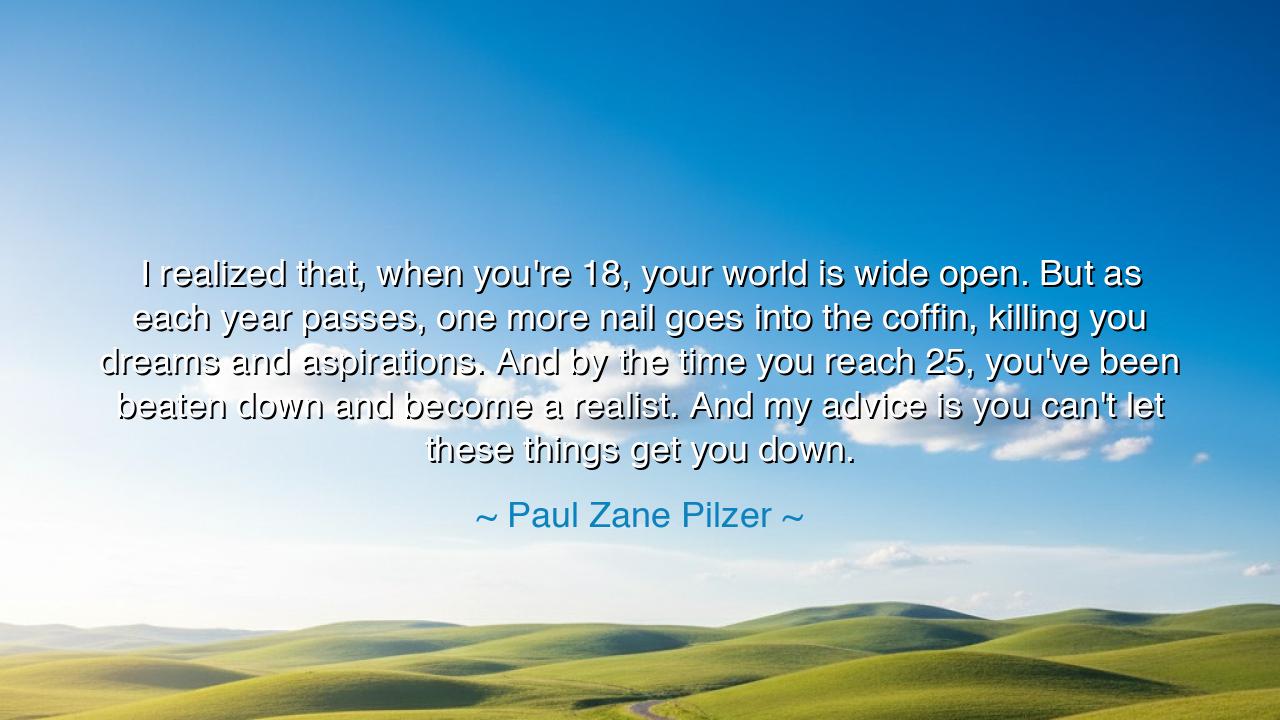
I realized that, when you're 18, your world is wide open. But as
I realized that, when you're 18, your world is wide open. But as each year passes, one more nail goes into the coffin, killing you dreams and aspirations. And by the time you reach 25, you've been beaten down and become a realist. And my advice is you can't let these things get you down.






When the sage Paul Zane Pilzer spoke these words, he was not merely lamenting the loss of youth—he was unveiling a truth that echoes through the ages: that as the years pass, the flame of human aspiration dims under the weight of the world’s expectations. At eighteen, the heart burns with infinite possibility. The horizon stretches boundless, and every dream seems within reach. But with each passing year, the world—cold and practical—hammers down upon that radiant hope. The nails of doubt, fear, and conformity seal the coffin of one’s youthful fire, and by twenty-five, many stand not as dreamers, but as realists, bowed by invisible chains.
Yet the elder’s counsel was not despair—it was resistance. He saw that though life conspires to narrow our vision, it is the sacred duty of the human spirit to defy decay. For the world will always whisper: “Be realistic,” as though reality were the enemy of greatness. The wise know otherwise. The ancients taught that realism without hope is death, but dreaming with courage is life everlasting. Pilzer’s words call upon us to guard the inner flame, to protect it as one guards a temple lamp from the winds of the night.
Think of Leonardo da Vinci, who in his youth painted the heavens and designed the impossible. Even when ridiculed, even when the world told him to temper his vision, he refused. His notebooks overflowed with the drawings of flying machines, weapons, and wonders centuries ahead of his time. Had he succumbed to realism, the Renaissance would have lost one of its brightest lights. For it is not age that kills the dream, but surrender. The one who continues to dream defies time itself.
The poet and philosopher Rumi once wrote, “Don’t grieve. Anything you lose comes round in another form.” These words echo Pilzer’s truth. When the young soul first feels the coffin nails of life’s disappointment, it must learn to transmute despair into wisdom. The loss of naïve dreams need not be death—it can be rebirth. The wise do not abandon their dreams; they refine them, forging them into visions that the soul can carry through the storms of time.
To the one who feels beaten down, remember this: reality is not your master—it is your canvas. The realist sees the wall; the visionary sees a door hidden within it. Every rejection, every failure, every disillusionment is but a test—a question whispered by fate: “Will you still believe?” The answer must be yes. For even the mightiest oak begins as a fragile seed, and only by pressing through the dark soil does it touch the sun.
Take then this teaching as your own: when you feel the coffin closing, push back. When you hear the hammer of despair, let your spirit roar in defiance. Dream again, even if the world calls you foolish. Create again, even if no one believes. Stand again, even when your knees tremble. For the true tragedy is not in failing—it is in forgetting that you once dreamed.
In your own life, practice this wisdom. Each morning, recall one dream you once abandoned, and breathe life into it again. Write it down. Take one small step toward it. Refuse to be among the countless who let the world dictate the limits of their imagination. Let your faith in possibility become your rebellion. For those who keep dreaming in the face of realism are not merely survivors—they are creators of destiny.
Thus, let Pilzer’s words ring through the corridors of your heart: You cannot let these things get you down. For though the nails may fall, the coffin never closes on one who remembers that within them burns the eternal light of youth—a flame that, if tended with courage, can never die.






AAdministratorAdministrator
Welcome, honored guests. Please leave a comment, we will respond soon